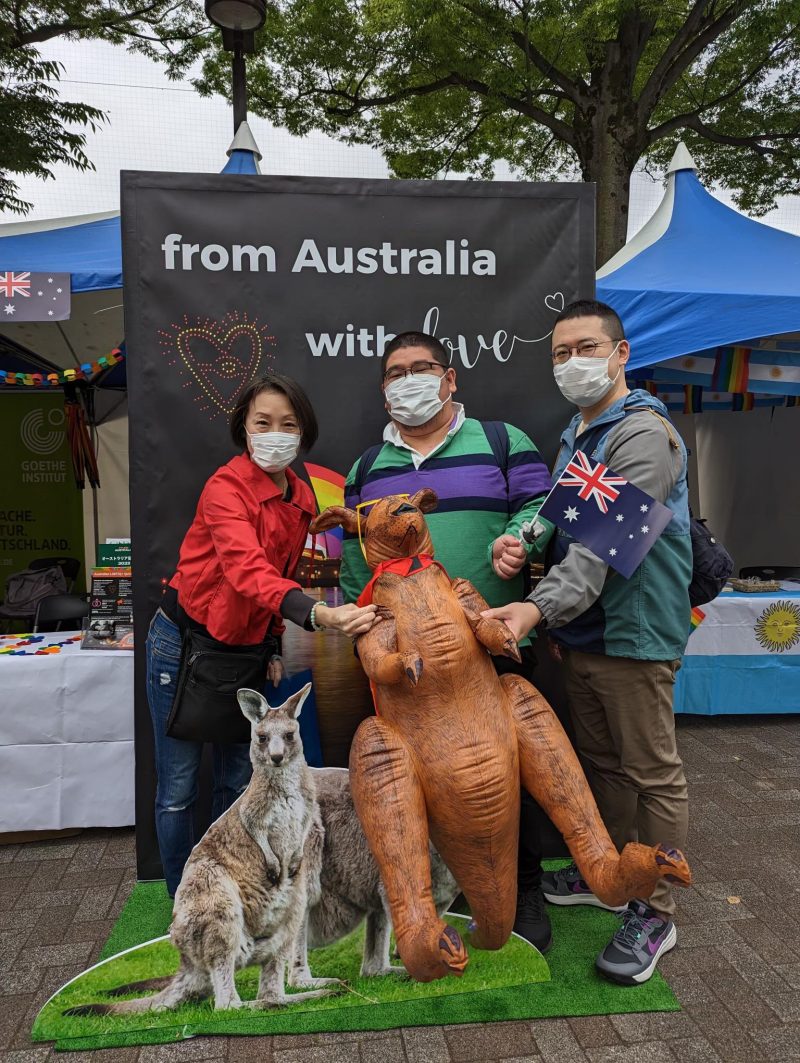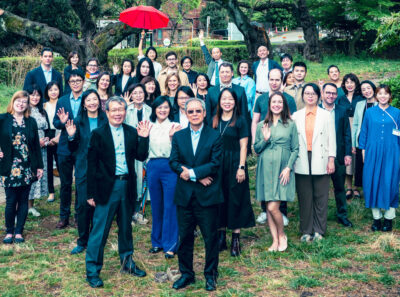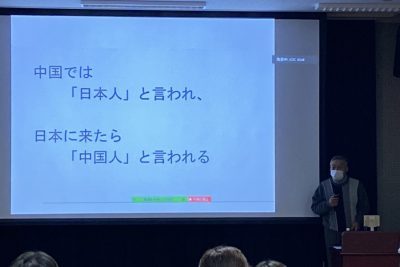A safe place at the intersection: Challenges and opportunities for LGBTQ disabled migrants in Japan

Tokyo College’s postdoctoral fellow Dr. Chunyan Li, and visiting scholar Jenni Schofield, who are both members of the Gender, Sexuality & Identity Group, interviewed two core members from Colorful Heart, Yuta ONAGA and Mikako UMAMORI about their experiences in Colorful Heart and insights about LGBTQ health and rights in Japan. Colorful Heart is a Tokyo-based peer support group for both Japanese and international members of the LGBTQ community with mental health issues, neurodevelopmental disorders and/or substance use disorders. They host regular group meetings (Colorful Meetings) in both Japanese and English, where attendants can have a safe space to talk and share their thoughts and experiences. Over the past few years, Colorful Heart has collaborated with other Japan-based LGBTQ, health, and welfare organizations to raise awareness about sexual diversity and mental health in Japanese society.
Mr. Yuta ONAGA: Volunteering in Colorful Heart as a LGBTQ person living with mental health and developmental disorders. Community advocate for LGBTQ individuals with mental health needs and public education on HIV pre-exposure prophylaxis (PrEP).
Ms. Mikako UMAMORI: Volunteering in Colorful Heart as a facilitator of Female Sexual Minority meetings and English Speakers’ meetings.
===
1. How did Colorful Heart come about?
ONAGA: In April 2016, a group was formed consisting of five LGBTQ individuals in Tokyo. At the start, all members, including myself, were dealing with mental health issues such as depression, bipolar disorder, developmental disorders, substance abuse, HIV, or were survivors of sexual abuse. We felt that it was difficult to discuss our mental health issues within the LGBTQ community, so we decided to create a safe space for ourselves to meet others facing similar issues and share our experiences, problems, and concerns. Our regular monthly meetings have become the foundation of our activities. We also hold learning sessions and talk events with occasional guest speakers. In addition, we collaborate with external organizations on research projects and are currently engaged in raising awareness about the HIV prevention medication PrEP.
2. What are/were some of the challenges that Colorful Heart is/ was facing?
ONAGA: At the beginning of our activities, we had difficulty approaching and recruiting participants because the group was not yet well-known within the local LGBTQ community. We started using social media to spread the word and created leaflets that we asked clinics to display, and little by little, we began to attract more participants. Currently, we operate with a small number of volunteer staff and would like to increase the number of staff who can work with us. As a financially vulnerable group, we do not have any paid staff. All of us, including myself, are engaged in other jobs to support our activities at Colorful Heart. Keeping a balance between the group activities, our other work, and personal time has been a challenge in recent years.
UMAMORI: As I started working for Colorful@Heart (or Colorful Heart for English MTG) from 2021, I can only speak of challenges we have faced since then. As Yuta mentioned above, more financial resources and volunteer involvement are of importance to improve our services and activities. Yuta and I work for Colorful Heart as volunteers and have full-time jobs outside it, so our available time for Colorful Heart is restricted. If we had more volunteer members, we could increase the classifications for our meeting groups and make each group more specific to each sexuality, gender, or mental issue. For instance, one of our meeting groups, Female Sexual Minority group, carries all self-identified females (some can be cis-female or trans-female, and others be non-binary) with marginalized sexualities (Lesbian, Bi-sexual, Pan sexual, Asexual etc.,) and with mental issues (neurodevelopmental disorders, mood disorders, personality disorders, somatic symptom disorders, substance-related disorders etc.) Regarding the English Speaker group, all genders, sexualities and mental issues are included in this one group. I think this is too general to cover each participant’s issue and it is probably difficult in two hours for them to feel like they share something in common.
In terms of volunteer involvement, Japanese people have just begun to think about how to live their own lives and realize there are various ways to live and volunteer involvement can be one way to enrich their lives. Therefore, we might need to wait to receive volunteer applications more frequently.
As for financial resources, we have managed to obtain donations from corporations to do events or create our brochures. If some funding is made available to our organization, and can be in effect relatively longer-term, we will be able to reimburse volunteers for transportation expenses and/or compensate them for their time involved. With our current workload, however, continually applying for funding consumes too much of our time, and thus, our current goal is to keep our current meetings open regularly to at least create a space for our participants who are in need.
3. Did the recent comments by the Prime Minister’s aide affect you, either as a group or on a personal level?
ONAGA: I became aware of the discriminatory remarks, which were reported in an extra edition (breaking news) by the Mainichi Shimbun, through my Twitter timeline. Politicians and those around them have been repeatedly making discriminatory remarks that are offensive and foster prejudice against the LGBTQ community for several years. This time, the remarks were extremely terrible and crossed the line. "I don't want to even see them, and I don't want them living next to me." This is a clearly contemptuous statement and not one that can be excused. I couldn't get this news out of my head for several days after it was reported.
UMAMORI: Personally, I was stunned by the news on the now-dismissed secretary to the Prime Minister. His remark was filled with hatred against LGBTQ members. To say, “(I) do not want to live next door (to an LGBTQ couple)” and “(I) hate even to see them,” is not acceptable as a bureaucrat. Even though his remarks were off the record, it is a deep-rooted issue that we have a political culture where casual conversations insulting LGBTQ people are allowed.
I believe, given their influence on society, bureaucrats (of course, politicians, too) should be more accountable for their remarks and actions, and should tailor their behavior to serve equally the people they represent.
Regarding the participants in both the Female Sexual Minority and English Speaker groups, I sensed their agony due to that incident during their discussions. Some of the participants expressed their psychological and physical disturbance by his remarks: for instance, reliving that incident, being agitated, having insomnia and/or feeling unwell. These disturbances are produced by not only those remarks, but also the repercussions from them. To add insult to the injury, numerous anti-LGBTQ comments around this incident on social media caused psychological and physical damage to them as well. Many of our participants rely on social media as a primary tool to interact with others; some of them rarely go outside to make friends due to their psychological/physical issues or financial issues. Therefore, our participants, as double minorities, are likely to be vulnerable to any malicious comments against LGBTQ, which could cause additional damage to them psychologically and physically.
4. Based on your experience, what are the key elements of providing culturally competent mental health support for LGBTQ migrants in Japan?
ONAGA: The social resources used by people with mental health problems include telephone counseling, medical examinations, and counseling at clinics. It may be difficult for anyone to express their distress (anxiety or conflicts) in a foreign language that is not their first language in situations like those mentioned above. I think it is important for those who provide medical care or counseling to be knowledgeable about the LGBTQ community. It is important to have inquiries and conversations that do not assume heterosexuality or cisgender. Understanding both language and the unique culture of the LGBTQ community is an important element that cannot be overlooked.
UMAMORI: As Yuta mentioned above, we need to increase services in foreign languages in hospitals, mental health clinics, city/ward halls, etc. In big cities like Tokyo, we might have some services in English, Mandarin, or other foreign languages, while such services are scarce in smaller and rural cities. Especially, issues associated with LGBTQ require culturally sensitive care. Service providers should not offend LGBTQ clients/patients with inconsiderate remarks or microaggressions that could be created by their ignorance. To improve these issues, we need to include education about LGBTQ people, psychological/physical disabilities, migrants, and race/ethnicity in their curriculum, and require them, for instance, to take a course yearly. Furthermore, we might need to keep in mind that not all foreigners prefer to receive services in their own language. One of our participants in the English Speaker Meeting who came from one East Asian country reported that they prefer to go to a mental clinic with only Japanese services, as they are cautious that interpreters in their own language might be an acquaintance of their friends.
5. In recent years, have you noticed any increase in acceptance for minoritized individuals (including, but not limited to, LGBTQ folks, disabled folks, migrants, etc.)
ONAGA: The recognition and acceptance of LGBTQ individuals in society has definitely increased. I believe it is the result of various groups and individuals working tirelessly to achieve this progress. As for disabilities, I feel that visible disabilities such as visual, hearing, and physical disabilities have been accepted by many people for a long time. However, mental health-related disabilities are often difficult to recognize at first glance, and they are often misunderstood as something irrelevant and difficult to understand, with various illnesses and disabilities being confused together. Regarding migrants, people in areas with many foreigners may feel their presence close to them. However, even in Tokyo, it is not a multicultural society compared to other major foreign cities such as London, New York, and Paris.
UMAMORI: Compared to 2 decades, I believe Japanese society is accepting minoritized individuals. LGBTQ issues, psychological/physical disabilities and migrants have been more visible in Japanese society. On the other hand, we need to make more improvements to accommodate them with a better quality of life. For instance, in Japanese companies, they should provide their employees with more education/training on LGBTQ equality and racial discrimination like global companies do. As for psychological disabilities, we need more public education since we do not have enough knowledge to distinguish each disorder and their symptoms. I get the sense that there are more potential patients in Japan who have yet to see a clinical psychologist/psychiatrist because they do not know what their psychological symptoms could be and that they might need treatment for their well-being. Psychological issues can occur to anybody, and mental illnesses are not specific to “crazy people.” Psychiatric/psychological science has been advancing day by day and we have gradually discovered more biological causations. In the future, many psychological issues will be under control of biological and psychological sciences, which could result in decreasing unnecessary discrimination and stigmas against people with mental illness. Regarding physical disabilities, we should create more accessibility in public. The relatively newer buildings and stations have elevators in big cities, while rural cities have yet to improve their accessibility. In addition, to help people with physical disabilities use public transportation with more ease (i.e., equip gaps between the train/bus and station platform/street across cities with wheelchair ramps), we need to rebuild transportation infrastructure. For migrants, I think they need more information resources in their native languages, not only in English.
Finally, I believe these requests and needs should be heard in Japanese society. Japanese culture tends to emphasize patience and not speaking up as a cultural value. Japanese society has changed, and we need to keep raising our voice for more change.
6. If you were provided with unlimited funding and resources, what 3 things would you do?
ONAGA: Since 2017, we have been conducting awareness-raising activities about PrEP, a medication for HIV prevention. We have added Japanese subtitles to movies, invited doctors who specialize in HIV and PrEP research to hold study sessions, and have been operating a website providing information on PrEP in Japanese. If we can obtain ample activity funds, we would like to expand our activities related to PrEP even more. In Japan, PrEP is not approved as a preventive medication, and there are few medical institutions that can prescribe it, and support for those who wish to take it is also inadequate. Developing a smartphone application with [Chunyan] Li, who has a lot of experience, would also be a good idea. In addition, we would like to have opportunities to learn from foreign groups that are taking advanced approaches in both mental health and PrEP. Finally, although it may be limited to the Tokyo metropolitan area, we would like to create a list of LGBTQ-friendly social resources in the form of a website and a booklet that could be useful not only to Japanese people but also to those who come from abroad and live in Japan.
UMAMORI: If we have unlimited funding and resources, I would like to hire facilitators for our previously mentioned self-help meeting groups to not only generate more categories of meeting groups in Tokyo, but also hold meeting groups in other cities for people who cannot travel to Tokyo. Then, I would like to create a training program for facilitators. The training would include skills and techniques in managing self-help meetings, some therapeutic techniques, LGBTQ studies, and psychological/psychiatric knowledge (e.g., psychological studies on ASD for the meeting group for ASD, transgender studies for the trans meeting group, etc.) Finally, I would like to have a social worker and/or mental health social worker in our organization and regular workshops to provide information on welfare services, job training programs, etc. that our participants could utilize in their ward/city.
===
The insightful conversations on LGBTQ rights and mental health in Japan with ONAGA and UMAMORI serve as powerful reminders that equality and inclusivity are not just abstract concepts but day-to-day life experiences of everyone. By amplifying their voices, we hope to foster greater understanding between individuals of different backgrounds, and work together towards a future where every individual can enjoy equitable access to health and celebrate their uniqueness. If you have any questions or comments about this blog, or if you have some ideas for future blogs on gender and sexuality topics, please do not hesitate to contact Dr. Chunyan Li via email (li.chunyan@mail.u-tokyo.ac.jp).








